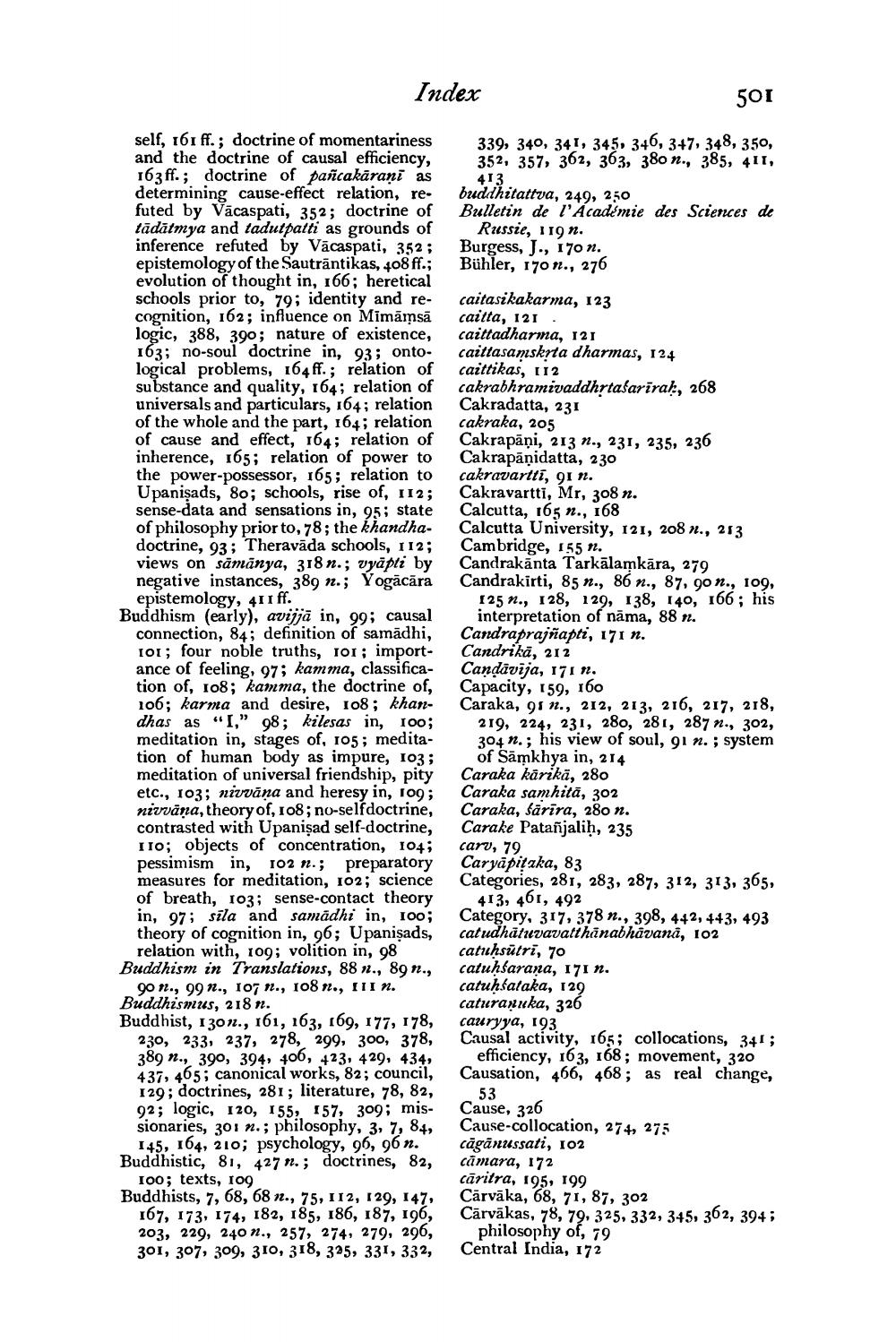________________
Index
self, 161 ff.; doctrine of momentariness and the doctrine of causal efficiency, 163 ff.; doctrine of pañcakaraṇī as determining cause-effect relation, refuted by Vacaspati, 352; doctrine of tädatmya and tadutpatti as grounds of inference refuted by Vacaspati, 352; epistemology of the Sauträntikas, 408 ff.; evolution of thought in, 166; heretical schools prior to, 79; identity and recognition, 162; influence on Mimamsā logic, 388, 390; nature of existence, 163; no-soul doctrine in, 93; ontological problems, 164 ff.; relation of substance and quality, 164; relation of universals and particulars, 164; relation of the whole and the part, 164; relation of cause and effect, 164; relation of inherence, 165; relation of power to the power-possessor, 165; relation to Upanisads, 80; schools, rise of, 112; sense-data and sensations in, 95; state of philosophy prior to, 78; the khandhadoctrine, 93; Theravada schools, 112; views on samanya, 318n.; vyapti by negative instances, 389 n.; Yogācāra epistemology, 411 ff. Buddhism (early), avijja in, 99; causal connection, 84; definition of samadhi, 101; four noble truths, 101; importance of feeling, 97; kamma, classification of, 108; kamma, the doctrine of, 106; karma and desire, 108; khandhas as "I," 98; kilesas in, 100; meditation in, stages of, 105; meditation of human body as impure, 103; meditation of universal friendship, pity etc., 103; nivvāna and heresy in, 109; nivvāna, theory of, 108; no-selfdoctrine, contrasted with Upanisad self-doctrine, 110; objects of concentration, 104; pessimism in, 102 n.; preparatory measures for meditation, 102; science of breath, 103; sense-contact theory in, 97; sila and samadhi in, 100; theory of cognition in, 96; Upanisads, relation with, 109; volition in, 98 Buddhism in Translations, 88 n., 89 n., 90 n., 99 n., 107 n., 108 n., III n. Buddhismus, 218 n. Buddhist, 130., 161, 163, 169, 177, 178, 230, 233, 237, 278, 299, 300, 378, 389 n., 390, 394, 406, 423, 429, 434, 437, 465; canonical works, 82; council, 129; doctrines, 281; literature, 78, 82, 92; logic, 120, 155, 157, 309; missionaries, 301 m.; philosophy, 3, 7, 84, 145, 164, 210; psychology, 96, 96 n. Buddhistic, 81, 427 m.; doctrines, 82, 100; texts, 109
Buddhists, 7, 68, 68 n., 75, 112, 129, 147, 167, 173, 174, 182, 185, 186, 187, 196, 203, 229, 240 m., 257, 274, 279, 296, 301, 307, 309, 310, 318, 325, 331, 332,
501
339, 340, 341, 345, 346, 347, 348, 350, 352, 357, 362, 363, 380 n., 385, 411, 413 buddhitattva, 249, 250 Bulletin de l'Académie des Sciences de Russie, 119 n. Burgess, J., 170 n. Bühler, 170 n., 276
caitasikakarma, 123 caitta, 121
caittadharma, 121
caittasamskṛta dharmas, 124 caittikas, 112 cakrabhramivaddhṛtafariraḥ, 268 Cakradatta, 231 cakraka, 205
Cakrapāņi, 213 n., 231, 235, 236 Cakrapāņidatta, 230 cakravartti, 91 n. Cakravartti, Mr, 308 n. Calcutta, 165 m., 168 Calcutta University, 121, 208 n., 213 Cambridge, 155 n. Candrakanta Tarkalamkara, 279 Candrakirti, 85 n., 86 n., 87, 90 n., 109, 125 n., 128, 129, 138, 140, 166; his interpretation of nāma, 88 n. Candraprajñapti, 171 n. Candrikā, 212 Candavija, 171 N. Capacity, 159, 160
Caraka, 91 2., 212, 213, 216, 217, 218, 219, 224, 231, 280, 281, 287 n., 302, 304 n.; his view of soul, 91 2. ; system of Samkhya in, 214 Caraka kārikā, 280 Caraka samhita, 302 Caraka, śärira, 280 n. Carake Patanjaliḥ, 235
carv, 79
Caryapitaka, 83
Categories, 281, 283, 287, 312, 313, 365, 413, 461, 492
Category, 317, 378 n., 398, 442, 443, 493 catudhatuvavatthanabhavana, 102 catuḥsutri, 70
catuḥsarana, 171 n. catuḥsataka, 129 caturaṇuka, 326 cauryya, 193
Causal activity, 165; collocations, 341; efficiency, 163, 168; movement, 320 Causation, 466, 468; as real change,
53
Cause, 326
Cause-collocation, 274, 275
cāgānussati, 102 camara, 172
caritra, 195, 199
Cärvāka, 68, 71, 87, 302
Cārvākas, 78, 79, 325, 332, 345, 362, 394; philosophy of, 79
Central India, 172




